Dreams at Their Fingertips

The 20-foot metal shipping containers that sit in the yard of 17 primary schools in the Rift Valley don’t carry cargo. They carry dreams.
Because these containers have been transformed into solar-powered computer classrooms, Kenyan kids can pursue a future their parents and perhaps even older siblings couldn’t imagine.
Students in schools where we provide computer education and teachers are discovering futures. They want to be pilots, doctors and teachers. They want to strengthen Kenya.
Catherine is one of those students. She is an eighth grader with a future in mind that would not be possible without computer skills.
“When I grow up I want to be a journalist,” she says. “That’s the reason why I want to know how to use a computer. So I can teach people from places of Kenya how to manage their resources and how to manage things for our country.”
The students look forward to the one or two computer classes they attend each week. They start with the basics like the keyboard and shortcut keys. Then they move onto Word, Excel and more.
Before long, the students often know how to use computers better than some of the other teachers in their school. Some students are tasked with using Excel to help teachers compile grades.
“I was very excited because before I couldn’t explain what a computer is,” says Francis, an eighth grader who is in computer class for the first time this year. “But now I know what is a computer. I’m very happy because I will be able to know more about technology.”
The classrooms are not connected to the internet, but the students are able to learn about it from an application that shows them how websites function.
“They will help me Googling and Googling what I’d like to do in future,” says George, an eighth grader who, for now, wants to be a pilot.
Harun Mungai Mbuthia has been one of our computer teachers since 2008, and his work has been instrumental in making this program a success. He teaches in a school with 1,400 students and has seen the impact of the program on students, families and the community.

“Ninety percent of my pupils here, their parents are computer illiterate,” he says. “This is because they have never seen computers. When they were in school there were no computers. So when we teach these children it is not only a help to them but even to their parents.”
The leaders in the schools are also grateful for the computer centers. They greet us warmly when we visit schools and always express gratitude for the computer and the lunch programs.
This year, a generous donation allowed us to renovate and reopen three classrooms that had been dormant for more than a decade.
Veronica is the deputy head teacher at one of those schools.
“We are happy because our place is very rural,” she says. “Most of them, they are very poor, and they cannot even make it together to go into the cyber [cafe] to know what they don’t know. But now you have just brought it near to them. God bless you.”
Bringing computers to more students in this area of Kenya will always be a significant part of the mission of Kenya Kids Can.
Jeff Gilbert is a guest writer and has visited numerous Kenya Kids Can schools. He teaches journalism at Cedarville University.
